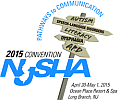Can Supported Conversation for Adults With Aphasia (SCATM) Effectively be Employed to Train Family Members of Adults with Chronic Aphasia?
Thursday, 11:00am to 1:00pm
Seabright
Poster 1
The aim of this study was to demonstrate the effectiveness of training family members of adults with chronic aphasia as conversation partners through the use of Supported Conversation for Adults with Aphasia (SCA). A total of nine participants, received a seven-week training in SCA from a researcher certified in the program. The participants were divided into five dyads consisting of an adult with chronic aphasia and his/her family member or caregiver. Pre- and post-training interviews were administered and analyzed using a Measure of Skill in Providing Supported Conversation for Adults with Aphasia [M(SCA)]. The skills measured by [M(SCA)] included: acknowledging competence, and revealing competence by ensuring the partner with aphasia understands. Within the later category, further measures identified ensuring the partner with aphasia has a means of responding, and verifying the person with aphasia understands. The results of the conversation partners' use of SCA indicated minimal improvement from pre-to-post training. Each of the participants improved in just one to two of the areas measured, and only by a single increment on a scale of 0-4. The conversation partners appeared to demonstrate a resistance to change in communication styles and approaches despite a six-session training. Additionally, none of the conversation partners demonstrated use of multimodal communication techniques (i.e., writing, drawing, or communication books).
Track:
Adult
